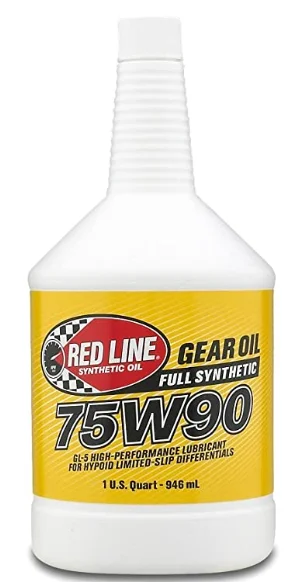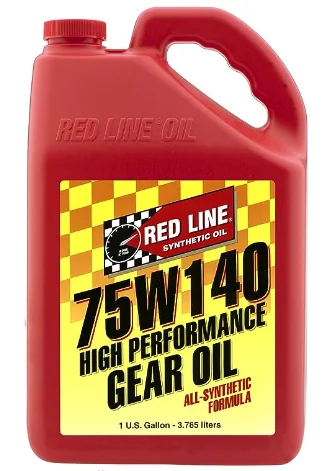
VS

Has it ever happened to you?
You’re driving your car to work—the regular journey on the usual way.
Tune a business podcast. Explore the new vision for trade.
Suddenly, 20 miles later, realize the drive axles are in disparate conditions. This time, barely hear what is discussed on the podcast. As if your car has been on autopilot.
What’s the culprit for the malfunctioning axles?
Yes, gear oil. It’s as important as engine oil to drive your vehicle smoothly.
However, 75w90 vs 75w140 has a great battle among the different grades of gear oil. But, nothing to worry about, as this article talks about every ins and outs of the oils.
Comparison Table Between 75w90 vs. 75w140
It’s a great idea to have a gist about the oils with a simple comparison table, isn’t it? So, why late, have a look at the below table and thank me for getting the information within a few seconds. Kidding!
| Features | 75w90 | 75w140 |
| Types | Full Synthetic | Full Synthetic |
| Used for | Gasoline engine | Diesel engine |
| Viscosity Index | 195 | 172 |
| Temperature range | 300°f to 350°f or 148.8°c to 176.6°c | -40°f or -40°c to above |
| Additional additives | Sulfur and phosphorus | Sulfur and phosphorus |
| High-temperature Resistance | Thinner so lower resistance | Thicker, so higher resistance |
| Fuel economy | Excellent | Good |
| Oil changing interval (Milage) | 50000 to 60000 miles | 80,000 miles |
| Compatible vehicles | Passenger cars, and light-duty trucks for usual use on city traffic | Heavy-duty trucks for hauling heavy loads on highways and racetracks |
What Do 75w90 And 75w140 Mean In Gear Oil?
First, it’s essential to understand the meaning of 75w90 and 75w140 in gear oil. Otherwise, the discussion may seem a little hard to you if you are a beginner.
In petroleum engineering, a two digits figure divided by ‘W’ indicates the thickness of the oil. That means, here, 75w90 and 75w140 tell you something about the liquidity rate of the oils.
The first digit for both oils is the same, 75. It means the oil can resist the same heat in the winter season and flows the same.
But, the second digit is 90 and 140. That means the 75w90 oil remains thinner in the hot weather, but the 75w140 will be thicker.
So, in high temperatures, the 75w90 won’t perform the same as 75w140. In short, that’s the fundamental difference between the 75w90 and 75w140.
We know these words can quench a little of your thirst, like a sip after a heavy workout session to know about their differences.
We arrange a quick overview of the oils, their benefits, and in-depth analysis. Just check it out by scrolling.
A Quick Overview Of 75w90
It is a fully synthetic oil that is formulated from refining crude oil. Basically, 75w90 oil offers outstanding performance at a lower temperature in your regular passenger cars and vehicles.
Because of its higher viscosity index, you won’t struggle to fill the oil in your gear reservoir. Even the correct viscosity will take time to evaporate, which keeps the oil fresh even after running high mileage. Luckily, it’ll promote your fuel economy.
The oil’s sulfur and phosphorus, additional detergents, ensure superior oxidation and thermal stability. That can incredibly enhance the gears and transmission drive axles’ maximum protection. The higher the protection, the lower the wear damage.
Advantages
- The right choice for regular cars for usual use
- Excellent load-bearing capacity to use in railway gearboxes
- Thinner viscosity ensures fast flowing in winter
- Excellent protection and performances
A Quick Overview Of 75w140
Heavy-duty trucks and trailers produce a lot of friction, heat, and vibrations during running. It happens due to the vehicle’s heavy load and large mechanical equipment. Here, the 75w140 works as a blessing to easily tackle all these challenges.
The oil is designed with higher chemicals and additional preservatives for fast flowing in high temp. So once the oil is poured on these heavily loaded vehicles, the differential and transmission bearings, gears, pistons, and other moving parts will be slippery with the oil. This is how the 75w140 prevents friction, overheating, and immature wear.
Apart from prevention, the oil is also suitable for performance for highway driving. Even in terms of non-toxicity and environmental friendly, it is also a safe choice for releasing less emission.
Advantages
- High heat-resistant synthetic oil for heavy-duty towing
- Protect friction, rust, and corrosion to prolong your differential life
- Prevent deposits and sludge formation in the gearbox
- Longer oil change intervals that reduce the hassle
A Detail Comparison of 75w90 Vs 75w140
Now, it’s time to focus on the core and detailed analysis of the oils.
Oil Pressure
How fast or slow the oil will flow to your vehicle’s mechanical components will define the oil pressure. So knowing the oil pressure will help you to choose the right gear oil.
75w90
The 75w90 oil’s g/cm3 is 0.86, and it will pass 90 ml per second, which is absolutely great for lubricating the metallic parts.
75w140
The 0.89 g/cm3 of 75w140 will flow around 140 ml per second under 15°c temp. If you consider the flowing rate for heavy-duty vehicles, that’s great.
Mileage efficiency
Generally, motorized vehicles are used to reach the expected destination within a bit of time. Here, the mileage efficiency of your gear oil plays a vital role in satisfying you. The better the oil, the higher the mileage efficiency it can offer.
75w90
This oil will perform excellently in low temperatures and city roads maximum of 50000 to 60000 miles or 80000 to 90000 kilometers. After that, you have to change the oil to get better shear, oxidation, and mileage performance.
75w140
Under scorching hot weather, the 75w140 will offer you around 80,000 miles or 125000 kilometers of efficiency. So, you can have a terrific highway driving with this oil without struggling with lower mileage performance.
Load Capacity & Vehicle Types
All the vehicles aren’t designed to carry heavy loads and won’t perform well with overloading. The load even impacts the gear oil performance. So you should check the loading capacity of the oil to get the maximum output.
75w90
This oil is the right choice for regular passenger cars, lightweight trucks for a light load, and lawnmowers. Because they are primarily used for usual, city, and less bumpy roads for a few hours.
75w140
On the other hand, heavy-duty construction or transportation trucks, Jeeps, Mobile cranes, Bulldozers, etc., are suitable for the heavy stuff. In that case, they are used for longer hours, bumpy roads, and pressing the accelerator and brake pedal frequently. This 75w140 oil can handle all those pressures because of its higher viscosity grade.
Fuel Economy
You won’t have to change the gear oil as frequently as the engine oil. But you can’t ignore the fuel economy of the oil. A higher fuel economy will save your pocket as well as saving your vehicle.
75w90
Since you use the 75w90 oil for usual driving, its viscosity is thinner. So the differential will need less fluid because of less accelerating and braking. As a result, it increases your fuel economy with less fuel consumption.
75w140
Heavy-duty vehicles run for long hours, so they are predicted to consume more fuel. Consequently, in terms of fuel economy, 75w90 can beat 75w140.
Related articles
FAQs
Can you use 75w140 instead of 75w90?
According to most users, you can use 75w140 instead of 75w90 because you won’t find significant changes in the vehicle’s performance.
Can you mix 75w90 and 75w140?
Yes, you can mix 75w90 and 75w140 oils, and at that time, your oil viscosity will be 75W115. Since this viscosity won’t severely impact the axles and differential of the vehicles. So you can mix the oil.
If you accidentally mix both oils, that’s perfectly alright. But don’t mix the oil willingly, as 75W110 viscosity oil is already available in the market.
What To Choose Between 75w90 Vs 75w140?
There is no fixed or black-and-white recommendation. Because 75w90 and 75w140 oils have their strengths and weaknesses and are absolutely great for different purposes.
75w90 is suitable for regular passenger cars to drive on city roads in the winter or low temp regional areas.
Conversely, 75w140 is perfect for heavy-duty vehicles to drive on highways in the summer season or high temp regional areas. But, checking OEM recommendations, or consulting the manufacturer, indeed, will be the best practice.

Hello, I’m Gary. Welcome to my blog.
Complete graduation from Weber State University ( Department of Automotive Technology)
I have been working with automotive for about 17 years. I have a garage in New Jersey.
In my spare time, I love to spend time with my family. Driving new cars is my hobby.